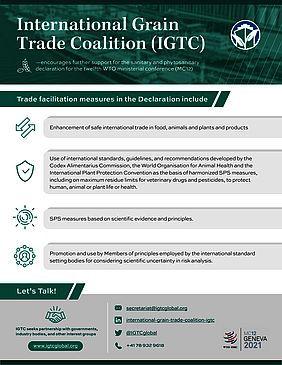In the context of the 25th anniversary of the WTO’s SPS Agreement and the 12th Ministerial WTO Conference (MC12) that will take place at the end of November 2021, IGTC continues to highlight its support for the “SANITARY AND PHYTOSANITARY DECLARATION FOR THE TWELFTH WTO MINISTERIAL CONFERENCE (Rev9)" that is currently under the spotlight at the WTO SPS Committee.
The November 2021 WTO SPS Committee meeting saw further support for the Declaration among WTO members, as well as agreement on a schedule of work and discussions on SPS priorities (report here).
Upcoming events in 2022 include -
- March: thematic session on trade facilitative approaches to pesticide maximum residue levels (MRLs), including substances not approved for use in an import market. This topic was proposed by Australia, Colombia, Paraguay and the United States (G/SPS/GEN/1947).
- June: thematic session on the use of virtual audits and verification systems in regulatory frameworks, following a submission by Australia (G/SPS/GEN/1949/Rev.1).
- June: workshop on transparency, where members will be able to learn about a new platform integrating SPS and technical barriers to trade (TBT) online tools.
- November: thematic session on international standards and best practices in pest risk identification, assessment and management, as proposed by the European Union (G/SPS/GEN/1951/Rev.1).
IGTC supports the SPS Declaration on the basis that it prioritizes global governmental action on:
- Facilitation of sustainable intensification of agricultural production and international trade.
- Use of international standards, guidelines, and recommendations developed by the Codex Alimentarius Commission, the World Organisation for Animal Health and the International Plant Protection Convention as the basis of harmonized SPS measures, including on maximum residue limits for veterinary drugs and pesticides, to protect human, animal or plant life or health.
- SPS measures based on scientific evidence and principles.
- Promotion and use by Members of principles employed by the international standard setting bodies for considering scientific uncertainty in risk analysis.
- Enhancement of safe international trade in food, animals and plants and products thereof through the adaptation of SPS measures to regional conditions, including pest-or disease-free areas and areas of low pest or disease prevalence which can strengthen Members' ability to protect plant and animal life or health through efforts to limit the spread of pests such as the Mediterranean fruit fly, diseases such as African swine fever, disease-carrying organisms, or disease causing organisms.


Follow us on social media